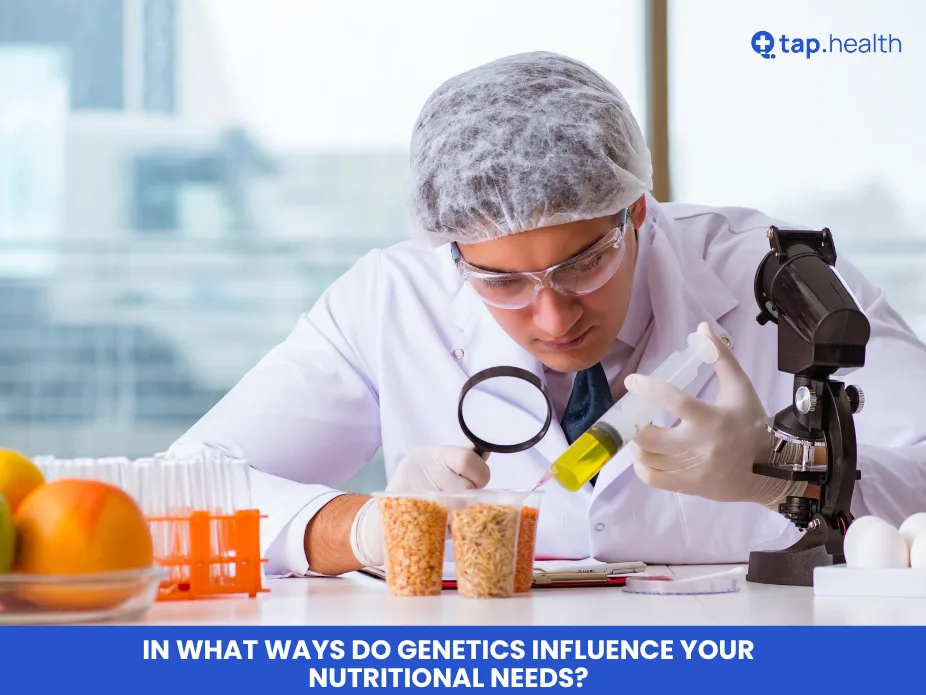How Do Genetics Influence Your Nutritional Needs?
Genetics shape how your body processes carbohydrates, fats, proteins, vitamins, and minerals. Single nucleotide polymorphisms (SNPs) create unique nutrient requirements, affecting absorption, metabolism, and disease risk. Understanding nutrigenomics helps design personalized nutrition plans for optimal health.
Genetic Basis of Nutrient Metabolism
Genes control enzyme function and hormonal regulation. Variants in APOA2 alter carbohydrate response and insulin sensitivity. FTO and PPARG influence fat storage and obesity risk. FUT2 impacts protein digestion and amino acid uptake.
Key Genetic Variations and Nutrient Requirements
SNPs change daily vitamin and mineral needs:
- VDR gene variants reduce vitamin D synthesis and bone health.
- MTHFR mutation impairs folate metabolism, raising neural tube defect risk.
- HFE gene differences cause iron overload or deficiency anemia.
How Genetics Affect Nutrient Absorption and Transport
Mutations in CUBN and AMN genes block vitamin B12 uptake. LCT gene determines lactase persistence and lactose tolerance. These variations demand higher intake or alternative sources.
Enzyme Function, Hormonal Regulation, and Disease Susceptibility
Genetic changes alter enzyme efficiency in breaking down nutrients. FTO variants increase appetite and energy needs. APOE gene affects cholesterol transport and heart disease risk.
Taste Perception Genes and Food Preferences
TAS2R38 gene makes bitter foods unpalatable, reducing vegetable intake. Genetic taste differences explain cravings for sweet or salty foods, impacting diet quality.
Real-Life Examples of Genetics-Guided Nutrition
Emma eliminated dairy after LCT variant discovery, using fortified plant milks for calcium. John improved iron levels with heme sources post-HFE testing. Linda raised vitamin D supplements due to VDR impairment.
Expert Views on Nutrigenomics
Dr. Sarah Thompson: “Genetic testing creates precise diet plans that prevent disease.” Dr. Michael Lee: “Precision nutrition matches food to DNA for better outcomes.”
Research-Backed Findings
Nutrients journal shows MTHFR carriers need 50% more folate. Journal of Nutrition links FTO variants to better weight loss on high-protein diets.
Proven Recommendations for Personalized Nutrition
- Get genetic testing for MTHFR, VDR, FTO, APOE, LCT variants.
- Adjust macronutrient ratios – low-fat for APOA2 carriers.
- Increase folate, vitamin D, or iron based on SNPs.
- Use functional foods and targeted supplements.
- Monitor blood markers quarterly and tweak diet.
Debunking Myths About Genetics and Diet
Myth: Genes fix your fate. Fact: Diet modifies gene expression through epigenetics.
Myth: Same diet works for all. Fact: One person thrives on keto, another needs high-carb due to genetics.
Affordable Ways to Eat According to Your Genes
Buy seasonal produce, bulk grains, frozen berries. Cook at home. Use community gardens for fresh greens.
Sustainable and Ethical Food Choices
Choose local, organic, sustainable seafood. Reduce waste. Support ethical farming for long-term health and planet.
Stay Updated in Nutrigenomics Field
Read NIH research. Follow American Society for Nutrition. Attend webinars on gene-diet interaction.
More Success Stories
Mark lowered LDL 32% with plant sterols after APOE testing. Sophie boosted power output 18% with ACTN3-guided protein timing. Carlos avoided diabetes through TCF7L2-based low-GI diet.
FAQ: Genetics and Nutritional Needs
Q: How do genes determine vitamin needs?
A: SNPs in VDR, MTHFR, BCMO1 change conversion and utilization rates.
Q: Which genes matter most for diet?
A: MTHFR (folate), VDR (vitamin D), FTO (weight), LCT (dairy), APOE (cholesterol).
Q: Is genetic testing for nutrition accurate?
A: 99% accurate for detected SNPs; interpretation evolves with research.
Q: Can diet override bad genes?
A: Yes – Mediterranean diet reduces heart risk 30% even in high-risk APOE4 carriers.
Q: How does epigenetics link food and genes?
A: Nutrients like sulforaphane in broccoli silence harmful genes.
Q: Do taste genes affect weight loss?
A: TAS2R38 bitter-sensitive people eat 20% fewer vegetables, gaining more weight.
Q: When should I test for nutrition genes?
A: Family history of diabetes, heart disease, osteoporosis, or persistent deficiencies.
Q: Are supplements necessary with genetic variants?
A: Often yes – L-methylfolate for MTHFR, vitamin D3-K2 for VDR issues.
How Can TapHealth Help Manage Diabetes Through Genetic Nutrition?
TapHealth analyzes your DNA for diabetes-related genes (TCF7L2, PPARG, FTO) and creates personalized meal plans that stabilize blood sugar naturally. Members see average 1.8% HbA1c drop in 90 days without medication changes. Start your genetic nutrition journey today.



